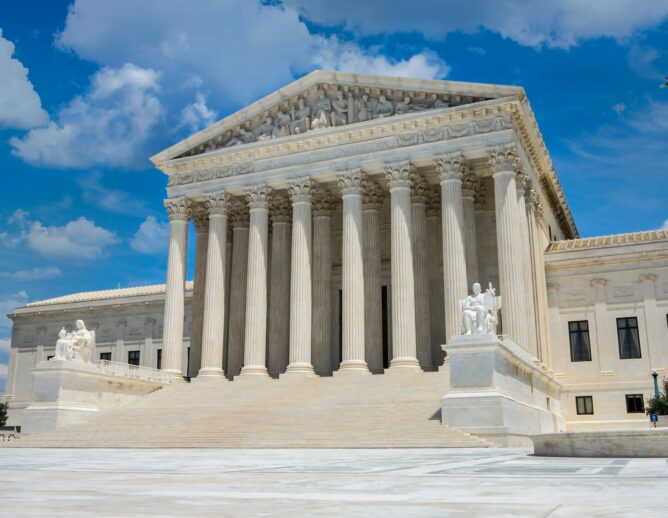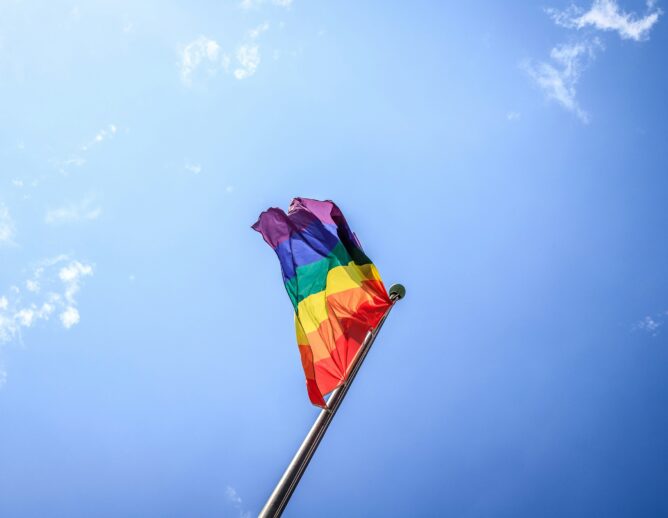
Marjory Stoneman Douglas High School students and supporters rally for gun control in Tallahassee, Florida, on February 21, 2018. Image courtesy of the Denver Post. Photo by Don Juan Moore/Getty Images.
Over the past month or two, we’ve heard some proposals, both innovative and long-standing, to address violence and joblessness.
Let’s start with the President’s suggestion that immigrants who enter our country – whether through several legal immigration routes or as unaccompanied minors – are a great threat to our safety. The proposed solutions are to keep would-be immigrants out of the United States and to do more to remove immigrants from this country who have not entered legally.
Surely the President is right. The fewer immigrants in this country, the less crime there will be here. I admit to not having checked the statistics, but I would venture that countries like Tuvalu (you know, one of those small Pacific islands) and Lichtenstein have both fewer immigrants than the United States and less crime too, proof if you ever needed that keeping your immigrant totals low is good for public safety.
Now, one might be tempted to look to some statistics for here in the United States. I was. Turns out that native-born Americans are nearly twice as likely to be incarcerated as undocumented immigrants, and more than three times as likely to be incarcerated as legally-present foreign-born immigrants.
I can only conclude, then, that if keeping out (and kicking out) immigrants is a good solution to crime and violence in the United States, then a truly great solution would be to expel native-born Americans. Perhaps we might begin with a one-to-one match – for every immigrant deported, or estimated to be stopped by a big beautiful wall at our southern border, one randomly chosen non-immigrant American is stripped of their citizenship (clearly undeserving of being a citizen of the United States given their criminal propensity) and expelled. If the policy proves successful, we could increase the number of expulsions. And given the statistical evidence, if we really, truly want to make America safe, we would best redirect funds from that wall along our border to be used instead to pay countries to accept all those former American citizens whom we expel.
Moving now to another crime-related issues, gun violence. The latest scene of that American tragedy called “School Mass Murders” unfolded in Florida a few weeks ago. As the debate of what to do to prevent future such incidents picked up, I was reminded of that favorite line of the National Rifle Association: “The only way to stop a bad guy with a gun is with a good guy with a gun.” That always seems to be the answer, doesn’t it? More guns will make us safer, just as long as the guns are in the right hands. Makes perfect sense, of course. We need lots of good guys to have guns. Then the forces of good can win all these wars playing out in our schools and our places of public gathering.
This raises the question: Who are the “good guys”? How can you tell the good guys from the bad guys? There is much talk these days about arming teachers. Let me propose another possibility: look to our children. After all, who could be more “good guys” than our innocent children? The younger the better, before society’s ills can influence them. If enough young children have guns, then we could have an all-children, national police force that can keep us safe.
Some good news on this front – we’re on our way there. Take the recent Wisconsin law that removed the minimum age at which children could hunt. In fact, Wisconsin is the 35th state to extend the right to bear arms to our youngest children when it comes to hunting. Our political leaders are seeing the light. They know who will comprise the well-regulated militia to protect us.
Enough talk of violence and tragedies. Let us look to a progressive attempt to enable people to work, surely a fine goal. I am referring to the waivers that the current administration will, and has begun to, issue to states to condition Medicaid on requiring recipients to work or undertake other “community engagement activities,” like volunteering and job training. The administration’s and states’ rationale is infused with benevolence – they want to help move people out of poverty and into jobs. Work will provide dignity and better health.
Now, this seems to presuppose that people on Medicaid who are jobless are not working because they don’t want to work. If they are poor and don’t want to work — that is, if they are apparently quite content to live in poverty — then I must conclude that there is something very satisfying about a life of poverty. (Is it the thrill of not knowing whether your food budget will last you and your family until the end of the month? Or the adrenaline rush of finding yourself unable to pay your phone bill and needing to figure out how you will cope without phone service?) Indeed, they must enjoy being out of the workforce quite a bit to need the threat of ending their health coverage – which their very lives may depend upon – to encourage them to work.
With this insight in hand – that living in or near poverty is a highly desirable lifestyle – then perhaps the work requirements are the wrong way to go. Perhaps it would be better to enable more people to enjoy the life of poverty. Let’s replace the minimum wage with a maximum wage. Good-bye Earned Income Tax Credit. Congress could demonstrate real leadership here, axing their own salaries so congresspeople, too, can experience the joys of poverty.
Okay. Back to reality. Of course expelling Americans is not the answer to crime in the United States – just as limiting legal migration or speeding up deportations of undocumented immigrants is not the answer. If we are really concerned about crime among undocumented immigrants, we should ensure them a pathway to citizenship – I noted above that while undocumented immigrants commit less crime than native born Americans, legally present foreign-born Americans commit less crime still – and facilitate their ability to earn a good living.
And as for crime, while that is also a far larger topic than I can address in this short piece, suffice to say that addressing conditions that drive crime, and more targeted approaches like the Portuguese model of decriminalizing drug use, investing in education in prison, and helping people who have been imprisoned re-enter the community, would help a great deal. So would deconstructing the innumerable legal barriers that keep people who have been imprisoned from integrating into society, including restrictions on voting, public benefit programs, and employment.
Moving on, arming children is of course a scary, dystopian idea. What we could do, though, is to follow the lead of other wealthy countries (and efforts of some U.S. states) to enact and enforce meaningful gun control measures – measures that would protect our children and all of us not only against the headline-making mass murder of a school shooting, but also against the far more common reality of gun death in America, suicides and the daily shootings that don’t make national headlines. Singer-songwriter Tom Paxton puts it so well, so simply, referring to instances of mass shootings, but applying as well to the other 30,000-plus gun deaths in the United States each year: “What if he couldn’t lay hands on a gun?” (Listen.)
I know that the political dynamics have long worked against gun control, with occasional glimmers of hope only for the narrowest of (though still valuable) measures at the national level. But political dynamics are not immutable; ours would be a far different country if they were. Rep. Gabby Giffords, shot in January 2011 in a mass shooting that left 6 dead, Michael Bloomberg, and others have started political organizations against gun violence. John Lewis led a remarkable House sit-in in 2016. Survivors of the Florida school shooting earlier this month are demanding change. Change will come when enough people demand it.
And lastly, the Medicaid work requirements. Facilitating people’s path to employment can indeed help them out of poverty, and to a greater sense of personal dignity and to better health. But conditioning people’s human right to health on working? This is an approach that not only violates people’s rights, but is illogical. Losing health insurance will lead to worse health, impeding people’s ability to work.
Most people on Medicaid do work, 60% of nonelderly adult recipients, while 79% live in a household with at least one working adult. And when people who have Medicaid are not working, it is typically for a very sound reason – they are ill or disabled themselves, taking care of their home or caring for a family member, or going to school, to name the top three reasons in a 2016 review. A small minority, 6%, were not working because they could not find a job. If any were not working simply because they choose not to, their numbers were too few to register.
So if the aim is to help Medicaid recipients work, more and better health care, not less, may help some (those presently ill and disabled). So might expanding Medicaid support for home care for the elderly, or other programs to help with caregiving, such as affordable child care. Threatening an end to their Medicaid will not help people who haven’t been able to find a job to find one. Expanded job training and helping connect people to jobs for which they are qualified (parts of the Indiana Medicaid work requirement program), a serious infrastructure plan to create new jobs – these are among the approaches that could help.
It is easy to scapegoat, whether immigrants or low-income Americans. It is easy to leave things as they are, as we have with national gun laws. We could travel down paths to further darkness, and create a more violent, angry, divided, fearful country, replete with walls that block people, that block understanding (such as resorting to stereotypes as to why people are not working), and that block basic human decency and compassion. Or, as so many millions of Americans are doing, we could know that there can be a very different America…and persist, persist, persist.



